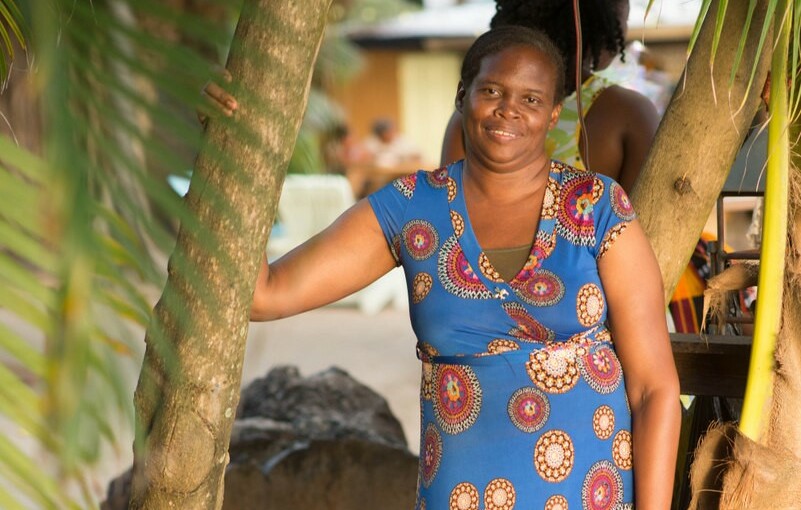Informing resilience decision making in Grenada and Saint Lucia
Strengthening gender risk and needs data and analysis and use

Gaps in gender data and analysis
Lack of data and gender analysis makes it hard to identify the separate needs and vulnerabilities of women, girls, men and boys. The completion of recent studies looking at the gender inequality of risk in several Caribbean countries including Saint Vincent and the Grenadines whose La Soufriére volcano is in an eruptive stage, has been described as timely.
Representative for UN Women Multi-Country Office – Caribbean, Tonni Brodber explained that the studies were carried out under the Government of Canada and the UK Foreign, Commonwealth & Development Office (FCDO) funded EnGenDER project.
“We have already been able to use one of the reports around the cost of inaction to support Saint Vincent and the Grenadines going through this volcanic hazard situation, so we know that these reports are really timely, user-friendly and applicable to the circumstances in the Caribbean right now” Tonni Brodber.
Increasing evidence of differential risk
This study aligned with global evidence that women and men respond differently to various forms of risk and in the various stages of disaster impact and recovery. This means, their distinct coping mechanisms and means of adapting, must be analysed and included in disaster and climate change planning, mitigation, preparedness, response, and recovery. The UN Women Representative said while the support to Saint Vincent and the Grenadines is in the early recovery phase, she expects that it would give further insight into risk analysis and recovery responses.
In fact, a Gender Inequality and Cost of Inaction Study completed in late 2020 for Saint Vincent and the Grenadines revealed that approximately 3,300 women farmers are heavily involved in crop production, livestock as well as agro-processing activities. With the eruption’s devastating impact on the agricultural regions in the red zone, this means the likelihood of women livelihoods being affected post-impact of the Volcano eruption is high.
Ms. Brodber’s remarks came at the launch of two additional gender inequality of risk and cost of inaction studies – this time, for Grenada and Saint Lucia. Research shows that the multiple discriminations that women face are key underlying drivers that make women more vulnerable in crises and post disasters situations.
She further noted: “We know that the national climate change gender action plans need to be more gender-responsive and in Grenada we are seeing where some of the gaps are in relation to agriculture and health - agriculture being a key sector for our ability to build back equally from COVID-19, and in Saint Lucia, agriculture and fisheries and water, are again key sectors for building back equal. We need to be thinking really intersectionally about this – people with disabilities are women and men, the elderly are women and men, if we are trying to be as accurate as possible for gender-transformative outcomes for the people of Saint Lucia and Grenada and the wider Caribbean.”
For example, women in Saint Lucia’s rural communities have been noted to be the main collectors of water for the household. This can result in an extended commute should they have to travel further to collect clean water post disaster impact. Therefore, there is need for sectoral adaptation strategy and action plans to embed gender and age considerations.
Moreover, single women in Grenada are particularly vulnerable to natural hazards and climate change impacts and are most likely to lack the capacity to cope, since their lower labour participation will be exacerbated due to loss of livelihoods and their susceptibility to domestic and intimate partner violence.
Looking ahead to the approaching hurricane season, Ms. Brodber said the data captured in the studies must be used as efficiently as possible across the sectors for the people it is intended to serve and understood by them too, in order to build back better and equal.
“We are so grateful to the Government of Canada and UK FCDO to be able to do this kind of work. As we are in the process of developing our new multi-country sustainable development framework (MSDF), it is not necessarily an issue of data deficit disorder in the Caribbean (but moreso) it is an issue of how do we collect, analyse and apply what we are seeing in the data so that is informing policy actively, that is something that not only UN Women but the entire UN System is looking to support Governments and civil society with throughout the next five years”, Ms Brodber added.
The Enabling Gender-Responsive Disaster Recovery, Climate and Environmental Resilience in the Caribbean (EnGenDER) project seeks to further integrate gender equality and human rights-based approaches into disaster risk reduction (DRR), climate change (CC) adaptation and environmental management frameworks and interventions to identify and address the gaps that must be eliminated to guarantee equal access to DRR, CC and environment solutions for men, women, boys and girls. The project is being implemented jointly by UNDP (lead), UN Women, WFP and CDEMA.